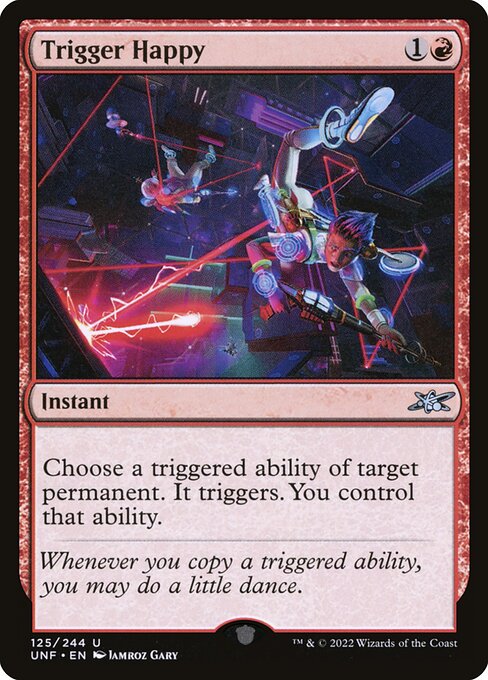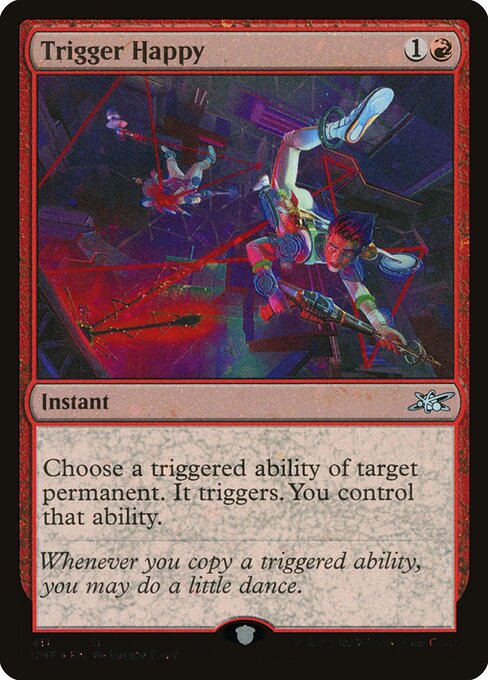standard
future
historic
gladiator
pioneer
explorer
modern
legacy
pauper
vintage
penny
commander
brawl
alchemy
paupercommander
duel
oldschool
premodern
Rulings
You can use Trigger Happy to cause abilities to trigger at unusual times. Sometimes that will make sense and be great. Sometimes it won’t.
The ability that triggered will think that it triggered at the normal time and for the normal reason. It may refer to attacking creatures you control, except it’s your opponent’s end step. It may be looking for a card in the graveyard after a dies trigger, but the creature is still sitting on the battlefield. It may be looking for the spell that caused it to trigger, but there was no spell. If the triggered ability can’t determine the information it needs, or if it can’t find the objects it expects to find in certain zones, those parts of the effect just do nothing.
Triggered abilities are abilities that start with “When”, “Whenever”, or “At”, generally at the start of a paragraph on the permanent. You can’t choose reflexive or delayed triggered abilities; these are triggered abilities that occur in the middle of a paragraph, usually after some kind of action or choice.
Some triggered abilities have an “intervening if” clause—that is, they are written in the form of “When/Whenever/At [trigger event], if [condition], [effect].” If you choose such an ability with Trigger Happy, you ignore the trigger event, and the ability will go on the stack even if the intervening if condition is not fulfilled, but the ability will still check the intervening if condition as the ability tries to resolve. If the condition is not fulfilled at that time, then the ability won’t resolve. For example, Tatyova, Steward of Tides has the ability “Whenever a land enters the battlefield under your control, if you control seven or more lands, [effect].” If you choose that ability, it will go on the stack regardless of how many lands you control. However, as the ability tries to resolve, if you don’t control seven or more lands, the ability fails to resolve and the effect doesn’t happen.
If a triggered ability is triggered with this spell, you ignore its trigger event—typically all the text between “When”, “Whenever”, or “At” until the first comma—and only consider the remaining text in that ability. For example, Complains Clerk has “Whenever you roll a 1, create a 1/1 white Clown Robot artifactcreature token.” If you choose that ability, you ignore everything up to the first comma, ending up with “Create a 1/1 white Clown Robot artifact creature token.”
You can choose triggered abilities which are represented by keywords, such as exalted. Most of those keywords will have “When”, “Whenever”, or “At” in their reminder texts. The visit ability of an Attraction is a triggered ability, so you can choose it. However, the “Prize” section on an Attraction is not a triggered ability, so that can’t be chosen separately. Nevertheless, you’ll get the prize if you choose the visit ability on that Attraction and successfully claim the prize.
Because you control the ability, you choose any targets it requires.
The ability that triggered will think that it triggered at the normal time and for the normal reason. It may refer to attacking creatures you control, except it’s your opponent’s end step. It may be looking for a card in the graveyard after a dies trigger, but the creature is still sitting on the battlefield. It may be looking for the spell that caused it to trigger, but there was no spell. If the triggered ability can’t determine the information it needs, or if it can’t find the objects it expects to find in certain zones, those parts of the effect just do nothing.
Triggered abilities are abilities that start with “When”, “Whenever”, or “At”, generally at the start of a paragraph on the permanent. You can’t choose reflexive or delayed triggered abilities; these are triggered abilities that occur in the middle of a paragraph, usually after some kind of action or choice.
Some triggered abilities have an “intervening if” clause—that is, they are written in the form of “When/Whenever/At [trigger event], if [condition], [effect].” If you choose such an ability with Trigger Happy, you ignore the trigger event, and the ability will go on the stack even if the intervening if condition is not fulfilled, but the ability will still check the intervening if condition as the ability tries to resolve. If the condition is not fulfilled at that time, then the ability won’t resolve. For example, Tatyova, Steward of Tides has the ability “Whenever a land enters the battlefield under your control, if you control seven or more lands, [effect].” If you choose that ability, it will go on the stack regardless of how many lands you control. However, as the ability tries to resolve, if you don’t control seven or more lands, the ability fails to resolve and the effect doesn’t happen.
If a triggered ability is triggered with this spell, you ignore its trigger event—typically all the text between “When”, “Whenever”, or “At” until the first comma—and only consider the remaining text in that ability. For example, Complains Clerk has “Whenever you roll a 1, create a 1/1 white Clown Robot artifactcreature token.” If you choose that ability, you ignore everything up to the first comma, ending up with “Create a 1/1 white Clown Robot artifact creature token.”
You can choose triggered abilities which are represented by keywords, such as exalted. Most of those keywords will have “When”, “Whenever”, or “At” in their reminder texts. The visit ability of an Attraction is a triggered ability, so you can choose it. However, the “Prize” section on an Attraction is not a triggered ability, so that can’t be chosen separately. Nevertheless, you’ll get the prize if you choose the visit ability on that Attraction and successfully claim the prize.
Because you control the ability, you choose any targets it requires.
Rulings
You can use Trigger Happy to cause abilities to trigger at unusual times. Sometimes that will make sense and be great. Sometimes it won’t.
The ability that triggered will think that it triggered at the normal time and for the normal reason. It may refer to attacking creatures you control, except it’s your opponent’s end step. It may be looking for a card in the graveyard after a dies trigger, but the creature is still sitting on the battlefield. It may be looking for the spell that caused it to trigger, but there was no spell. If the triggered ability can’t determine the information it needs, or if it can’t find the objects it expects to find in certain zones, those parts of the effect just do nothing.
Triggered abilities are abilities that start with “When”, “Whenever”, or “At”, generally at the start of a paragraph on the permanent. You can’t choose reflexive or delayed triggered abilities; these are triggered abilities that occur in the middle of a paragraph, usually after some kind of action or choice.
Some triggered abilities have an “intervening if” clause—that is, they are written in the form of “When/Whenever/At [trigger event], if [condition], [effect].” If you choose such an ability with Trigger Happy, you ignore the trigger event, and the ability will go on the stack even if the intervening if condition is not fulfilled, but the ability will still check the intervening if condition as the ability tries to resolve. If the condition is not fulfilled at that time, then the ability won’t resolve. For example, Tatyova, Steward of Tides has the ability “Whenever a land enters the battlefield under your control, if you control seven or more lands, [effect].” If you choose that ability, it will go on the stack regardless of how many lands you control. However, as the ability tries to resolve, if you don’t control seven or more lands, the ability fails to resolve and the effect doesn’t happen.
If a triggered ability is triggered with this spell, you ignore its trigger event—typically all the text between “When”, “Whenever”, or “At” until the first comma—and only consider the remaining text in that ability. For example, Complains Clerk has “Whenever you roll a 1, create a 1/1 white Clown Robot artifactcreature token.” If you choose that ability, you ignore everything up to the first comma, ending up with “Create a 1/1 white Clown Robot artifact creature token.”
You can choose triggered abilities which are represented by keywords, such as exalted. Most of those keywords will have “When”, “Whenever”, or “At” in their reminder texts. The visit ability of an Attraction is a triggered ability, so you can choose it. However, the “Prize” section on an Attraction is not a triggered ability, so that can’t be chosen separately. Nevertheless, you’ll get the prize if you choose the visit ability on that Attraction and successfully claim the prize.
Because you control the ability, you choose any targets it requires.
The ability that triggered will think that it triggered at the normal time and for the normal reason. It may refer to attacking creatures you control, except it’s your opponent’s end step. It may be looking for a card in the graveyard after a dies trigger, but the creature is still sitting on the battlefield. It may be looking for the spell that caused it to trigger, but there was no spell. If the triggered ability can’t determine the information it needs, or if it can’t find the objects it expects to find in certain zones, those parts of the effect just do nothing.
Triggered abilities are abilities that start with “When”, “Whenever”, or “At”, generally at the start of a paragraph on the permanent. You can’t choose reflexive or delayed triggered abilities; these are triggered abilities that occur in the middle of a paragraph, usually after some kind of action or choice.
Some triggered abilities have an “intervening if” clause—that is, they are written in the form of “When/Whenever/At [trigger event], if [condition], [effect].” If you choose such an ability with Trigger Happy, you ignore the trigger event, and the ability will go on the stack even if the intervening if condition is not fulfilled, but the ability will still check the intervening if condition as the ability tries to resolve. If the condition is not fulfilled at that time, then the ability won’t resolve. For example, Tatyova, Steward of Tides has the ability “Whenever a land enters the battlefield under your control, if you control seven or more lands, [effect].” If you choose that ability, it will go on the stack regardless of how many lands you control. However, as the ability tries to resolve, if you don’t control seven or more lands, the ability fails to resolve and the effect doesn’t happen.
If a triggered ability is triggered with this spell, you ignore its trigger event—typically all the text between “When”, “Whenever”, or “At” until the first comma—and only consider the remaining text in that ability. For example, Complains Clerk has “Whenever you roll a 1, create a 1/1 white Clown Robot artifactcreature token.” If you choose that ability, you ignore everything up to the first comma, ending up with “Create a 1/1 white Clown Robot artifact creature token.”
You can choose triggered abilities which are represented by keywords, such as exalted. Most of those keywords will have “When”, “Whenever”, or “At” in their reminder texts. The visit ability of an Attraction is a triggered ability, so you can choose it. However, the “Prize” section on an Attraction is not a triggered ability, so that can’t be chosen separately. Nevertheless, you’ll get the prize if you choose the visit ability on that Attraction and successfully claim the prize.
Because you control the ability, you choose any targets it requires.
Your collection? Your decks?
Want to manage your collection and/or create decks?


 0
0
 0.16€
0.16€
